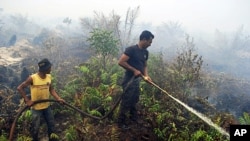Indonesia has yet to implement a moratorium on the burning of forests and peat lands that was scheduled to start on January 1st. The moratorium is part of a $1 billion deal with Norway to reduce greenhouse gas emissions caused by deforestation. Competing government groups are still arguing over elements of the plan.
An Indonesian government task force last year developed a strategy to reduce greenhouse gas emissions from deforestation and forest degradation. A key part of the plan is a two-year moratorium on clearing forests and peat lands.
The moratorium is part of a $1 billion deal with Norway to reduce Indonesia's carbon dioxide emissions, which primarily come from burning of forests and peat lands for farming and other development. Indonesia is the world's third biggest emitter of greenhouse gases, which many scientists say contributes to global warming. The government aims to slash emissions by 26 percent by 2020.
But the forestry ministry has also submitted a plan and is arguing it should oversee the moratorium. As a result, neither plan has been implemented, while the task force and forestry ministry reconcile their differences.
Hadi Daryanto is a member of the task force and the ministry's director general of forestry management. He says it is a question of legal authority.
He says the president's instructions were only for the forestry minister and all the provincial regents because only they have the authority.
Joko Arif is a forestry activist with the environmental organization Greenpeace. He says the competing plans differ on specific types of permits that would be affected, such as logging and mining, and on which government agencies would be involved in enforcing and overseeing the moratorium. He says the plans do not even agree on what areas will be protected.
"Up until now there are no clear definitions of forests which will be implemented related to this moratorium," Arif said. "For example the ministry of forestry said it is only for primary forests but some of the people in government said it is also for other type of forests, not only primary but also secondary forests."
Primary forests have never been cleared and secondary forests have re-grown.
Daryanto plays down any differences in the plans and in the delay in announcing the moratorium. He says the ban will protect almost 44 million hectares of primary forests, while applying sustainable forest management practices to an additional 48 million hectares.
And Daryanto says the national government has stopped issuing permits to develop primary forest land based on existing law.
He says using law number 41, the moratorium has already begun because it says that protecting the natural forests is a priority.
But he says illegal logging remains a problem and getting local authorities and other agencies involved is more complicated than anticipated.
Indonesia Delays Start of Forest Development Moratorium




